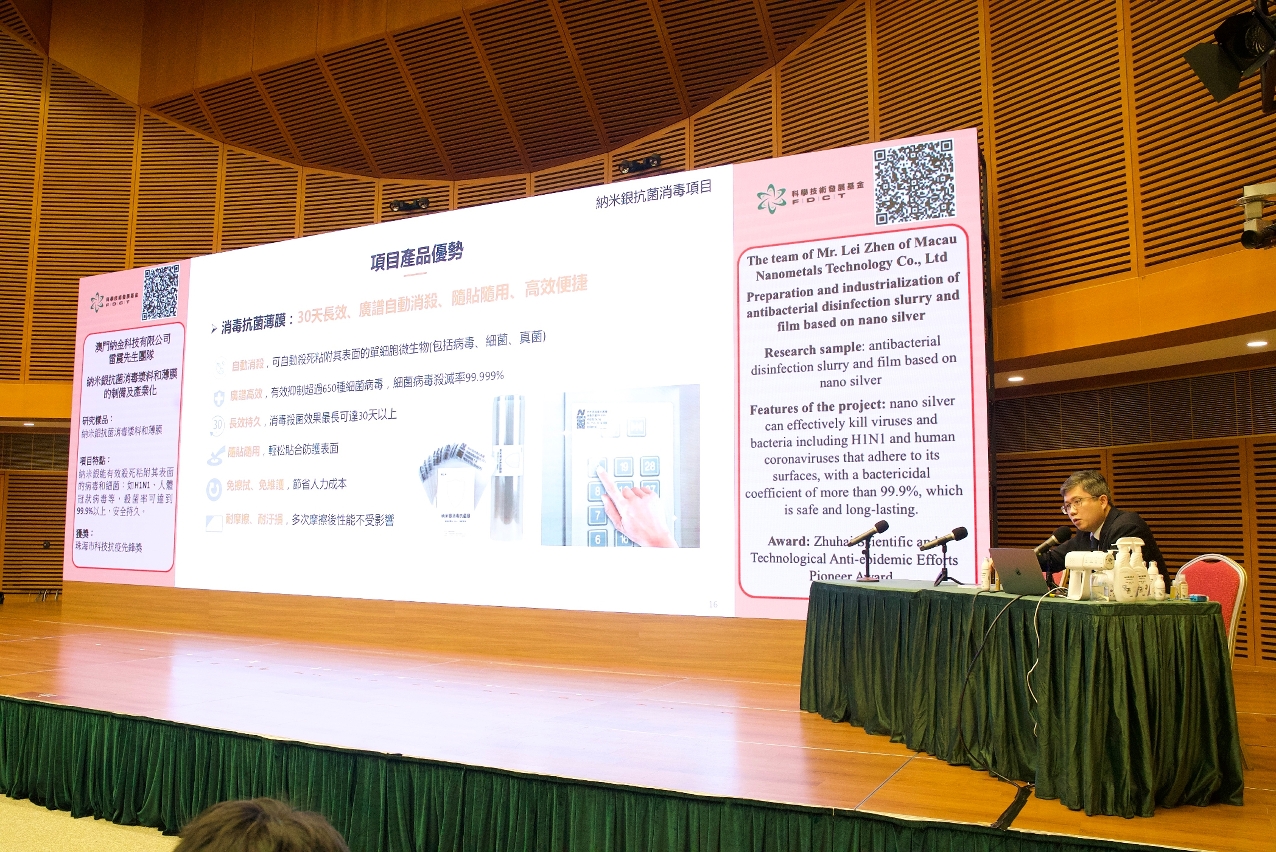 CEO of the Macau Nanometals Technology Co. Ltd. introducing its project results
CEO of the Macau Nanometals Technology Co. Ltd. introducing its project results
FDCT Holds a Meeting on Final Report on Research Projects against COVID-19
In order to align with the proactive prevention policy against COVID-19 adopted by the Macao SAR Government, the Science and Technology Development Fund (hereinafter referred to as the FDCT) solicited scientific research projects for coping with COVID-19 from local higher education institutions, science and technology enterprises and other institutions as early as the start of February 2020. Various institutions were keen to apply, with a total of 74 project applications received, of which 26 were finally approved. The projects mainly focus on the research of rapid detection and diagnosis technology; the research and development of effective Chinese and Western medicines; the application of information technology to body temperature detection; disinfection robots; prevention and control measures for infectious diseases, etc. It is hoped that through the research and development of anti-epidemic scientific research projects, enterprises, universities and other institutions will be encouraged to actively develop anti-epidemic application products.
With the purpose of promoting the application of scientific research results and reporting the research results of the project to the public, FDCT will hold the “Project Final Report Meeting on Scientific Research Projects for Coping with COVID-19” at 3:00 pm on March 29, 2022 in the conference hall of the Macao Science Center. Representatives from relevant government departments, local higher education institutions, science and technology enterprises, science and technology associations, and members of the public were invited to the meeting and briefed on the research results and details of project completion of the 5 scientific research projects for coping with COVID-19. The project results were reported by the scientific research teams of the University of Macau (UM), Macau University of Science and Technology (MUST) and the Macau Nanometals Technology Co., Ltd respectively and product demonstrations were also made at the meeting.
Results of 5 scientific research projects for coping with COVID-19
- The “Intelligent robot for anti-epidemic medical healthcare” developed by the team of Professor Xu Qingsong of University of Macau(UM) through mobile robots and artificial intelligence technology has realized human-machine separation, obstacle avoidance functions, various disinfection modes, as well as rapid and regular all-round disinfection and other technological innovations through multi-machine cooperation. The disinfection robots have been provided free of charge to various government departments including the Municipal Affairs Bureau (IAM), and used at trial sites such as the Kiang Wu Hospital and hotels. At present, many enterprises intend to realize the implementation and mass production of disinfection robots, which will help facilitate the industrialization level of Macao and the Guangdong-Hong Kong-Macao Greater Bay Area in related fields. In addition, the project has also granted 1 patent in China and received 6 awards, of which 3 are international and 3 are municipal.
II. The team of Mr. Lei Zhen from Macau Nanometals Technology Co., Ltd has developed nano-silver disinfection products through the project of “Preparation and industrialization of antibacterial disinfection slurry and film based on nano silver”, which can effectively inhibit more than 650 kinds of unicellular organisms such as the Staphylococcus aureus and the Escherichia coli, and kill viruses and bacteria that adhere to their surfaces. The products are effective in inhibiting and killing Influenza A virus subtype H1N1 and human coronaviruses. The sterilization effect of the antibviral film is still over 99.9% after being soaked in water for 30 days and rubbed violently for 2,000 times. The products have been tested and proofed to be safe, non-irritating and long-lasting, and have also been granted the Zhuhai Scientific and Technological Anti-epidemic Efforts Pioneer Award.
III. The “Key techniques for diagnosing new coronavirus SARS-CoV-2 infection based on artificial intelligence” was developed by the team of Professor Zhang Kang of Macau University of Science and Technology (MUST), which uses machine deep learning to analyze more than 530,000 CT images for the first time to develop the diagnostic system. The techniques can also provide diagnostic results with an accuracy rate of more than 90% in just 20 seconds, and predict severe and critical COVID-19 cases. The results were not only published in the world’s top magazine Cell, but also applied in nearly 20 hospitals in Macau, Guangzhou, Wuhan and other cities. In addition, they were deployed to Europe, the US, South Korea, Brazil, Ecuador and other countries and regions through the cloud platform to help with the worldwide fight against the epidemic.
IV. The team of Professor Ma Wenzhe of Macau University of Science and Technology (MUST), through the project of “Development and application of COVID-19 virus point-of-care testing reagent”, has developed testing reagent kits that realize the integration of virus specimen collection and inactivation and nucleic acid extraction, effectively eliminating the potential infection risks of “cover opening” for medical workers carrying out NAT tests and the contamination of samples by nucleic acids in the environment. The testing reagent kits are matched with the portable COVID-19 virus point-of-care testing instrument produced by the cooperation partner Beijing OriginGene-tech Biotechnology Co., Ltd., which lower the requirements for medical workers carrying out NAT tests and break through the limitation that NAT test must be carried out in the laboratory, and can be applied in various scenarios. The kits have obtained EU CE certification and are currently being tested in many countries in Europe, Southeast Asia, the Middle East, and Africa.
V. The project of “Digital Microfluidic chip for fast Coronavirus detection” by Professor Mak Pui In of UM was jointly developed with Digifluidic Biotech Ltd. Based on digital microfluidic technology and simultaneous amplification and testing technology for nucleic acid detection, the project enables simultaneous detection of two sets of COVID-19 genes on one chip, and the results can be obtained as soon as 20 minutes after the virus specimen is collected. The chip system has the advantages of being portable, fast and easy to operate.
Due to the epidemic situation, the report meeting will be carried out simultaneously online and offline under the strict compliance with various epidemic prevention measures and guidelines for control of the number of people in the activities to ensure that relevant information are available to the public. During the meeting, each project team answered the questions raised by the participants, and deepened their understanding of the development of the funded projects and the progress of phased research. For details about the contents of the reported projects, please refer to FDCT’s website (https://www.fdct.gov.mo). If you have any questions, please call 28788777 or email saf@fdct.gov.mo for inquiries.







